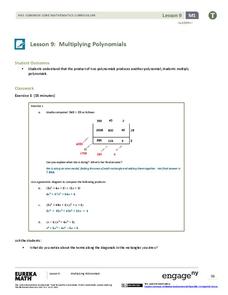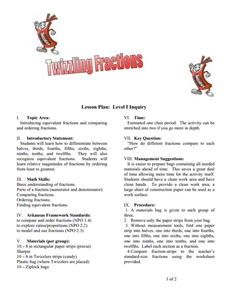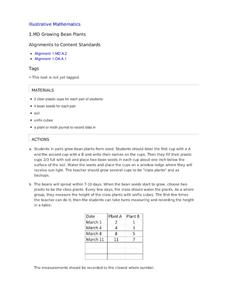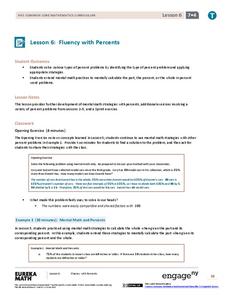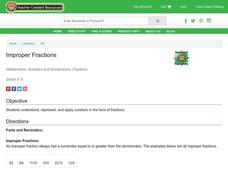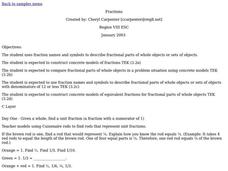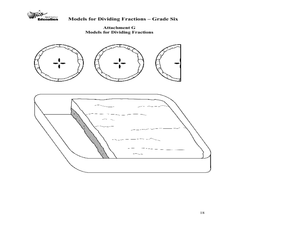Willow Tree
Multiplying Polynomials
Make two parts into a whole. Scholars learn to multiply polynomials to create a simplified polynomial expression. Polynomials include monomial, binomials, and trinomials.
Illustrative Mathematics
The Stamp Collection
By using language like "half of the stamps," children are exposed to patterns in arithmetic that requires solving a two-step word problem. This type of language opens a new door for transitioning learners toward understanding fractions...
Illustrative Mathematics
Dana's House
Your class is to find the percent of the lot that is not covered by a house. Make sure your pupils understand the problems before they begin. The lot is the whole of the percent problem and the house is the part. The exercise is good...
University of Arkansas
Twizzling Fractions
Using food as a manipulative is one of the best ways to incorporate hands-on learning in the classroom. This hands-on approach allows young mathematicians to compare, order, and identify fractions with the use of Twizzlers® and...
Curated OER
The Stock Market
Students explore the loss and gain made in the stock market as they invest a sum of money and report the results as percentages instead of points.
Curated OER
Best lesson in the whole world!
Learners study the concept of fraction using mathematical reasoning. In this problem solving fraction lesson, students use various methods to explain their reasoning in solving fractions. Learners use a number of different prompts to...
Curated OER
Multiplying By Whole Tens
In this multiplying worksheet, pupils count by tens, write the rule for multiplying by ten, and then multiply numbers by ten. Examples and explanations are given prior to the exercise. This two-page worksheet contains approximately 30...
Illustrative Mathematics
Growing Bean Plants
Plant growth experiments offer rich, cross-curricular learning opportunities that can really excite and engage young learners. For this series, children work in pairs planting, measuring, and comparing the height of bean plants in order...
EngageNY
Recursive Challenge Problem—The Double and Add 5 Game
Math is all fun and games! Use a game strategy to introduce the concept of sequences and their recursive formulas. The activity emphasizes notation and vocabulary.
EngageNY
Fluency with Percents
Pupils build confidence working with percents as they work several types of percent problems to increase their fluency. The resource contains two sets of problems specifically designed to build efficiency in finding solutions of basic...
Illustrative Mathematics
Margie Buys Apples
One of the most common, everyday applications of math is dealing with money. This single problem calculating how much change Margie receives is more involved than it appears at first glance. An understanding of how fractions and decimals...
Meadows Center for Preventing Educational Risk, University of Texas at Austin
Lesson 10 - Compound Words
Individually, words have power, but when added together, they can take on a whole other level of meaning. Readers learn about compound words in the 10th of 17 lessons of the Word Recognition and Fluency series. A script provides guidance...
Teach Engineering
Energy Efficiency
Using the resource is probably the most efficient way to learn about efficiency. The 18th installment of a 25-part Energy Systems and Solutions unit has pupils investigate energy efficiency through discussions and associated activities....
Curated OER
Improper Fractions
Young scholars work with fractions. In this improper fractions lesson plan, students define improper fractions and mixed numbers. Young scholars learn how to change improper fractions to mixed numbers or whole numbers.
Curated OER
The Part-Adder 2
Third graders use mental-math strategies to solve two-digit plus two-digit addition problems. They observe and discuss online demonstrations, solve word problems as a class, and independently solve problems and describe their solutions...
Curated OER
Fractions
Young mathematicians use fraction names and symbols to describe fractional parts of whole objects or sets of objects. They construct concrete models of fractions, and compare fractional parts of whole objects in a problem situation using...
Curated OER
Understanding Fractions - Cookbook Comparisons
Learners explore equal fractions in relationship to a whole unit. They fold strips of paper into halves, thirds, etc. and compare them to the first strip which represents a "whole unit." Fractional parts are identified and compared.
Curated OER
Domain: Operations and Algebraic Thinking
Practice basic operations for young mathematicians in fun ways! Using two decks of cards (Ace through 10 plus the joker), learners play "memory" by matching numbers that can be added to make 10 and writing number sentences. In another...
Curated OER
Popcorn Fractions
Upper graders explore fractions to determine a fractional part of a whole. They are given 30 pieces of popcorn and asked to divide it into halves, thirds, etc. Learners practice representing the popcorn groups as a numerator and...
Curated OER
Equivalent Fractions
Introduce elementary students, grades 3-5 to the concept of equivalent fractions. Each student folds a paper in half and color one of the equal parts of the paper. They use this paper to define numerator, denominator and the idea that a...
Ohio Department of Education
Models for Dividing Fractions - Grade Six
Fifth and sixth graders use food and candy to help them represent division of fractions and develop algorithms to solve fraction problems. They discuss dividing whole numbers by fractions. Pupils use sticks and chocolate bars to...
Curated OER
Relating Fractions and Decimals
Sixth graders identify how fractions and decimals both illustrate parts of a whole. They estimate which number is greater by comparing them to the given fraction and use greater than or less than symbols for each.
Curated OER
Hershey Chocolate Fractions
In order for students to acquire knowledge about math concepts, and in particular fractions, they need concrete ways to practice an abstract concept.¿¿¿ Using Hershey bars builds on prior knowledge as most students have probably...
Illustrative Mathematics
High Blood Pressure
Does watching TV increase one's blood pressure? Assess student understanding of how study design dictates whether a conclusion of causation is warranted. Use this as a prompt for a small group or whole class discussion, or as a part of a...
